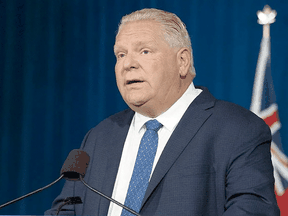Chris Selley: Doug Ford made a promise to 'respect' taxpayers. He just broke it
Federal politics has gotten along just fine without the per-vote subsidy since the Conservatives phased it out in 2014. Why not Ontario?

Article content
It won’t go down as Ontario Premier Doug Ford’s most memorable or important broken promise. It hardly even made the news last week. But the Progressive Conservative government’s decision to not just maintain the per-vote subsidy for political parties, but also to increase it from 55 to 63 cents, certainly ranks among the tawdriest.
“I do not believe the government should be taking money from hard-working taxpayers and giving it to political parties,” Ford argued in 2018. The explanations on offer for his sudden about-face are downright insulting.
“The discussion around the sunsetting of the existing quarterly allowance occurred in a pre-pandemic environment,” Attorney General Doug Downey told the National Post in a statement. “(It) was based on an expectation that parties and candidates could increase outreach and engagement with voters without facing unprecedented obstacles like the ones caused by COVID-19.”
He added: “We don’t want a situation where parties aren’t part of the discussion because they can’t afford to be there.”
Readers unfamiliar with the current state of political-party fundraising — normal people, that is — might assume from Downey’s statement that donations have cratered during the pandemic. They have not. The Ontario Tories raised only 10 per cent less in 2020 than they did the year before: $4.5 million versus $5 million. The Ontario Liberals, meanwhile, tripled their 2019 results, hauling in $3.5 million.
That’s far better, relatively speaking, than their federal counterparts: in 2019 the Liberals and Conservatives brought in roughly 40 and 50 per cent more than in 2020. A more positive way to frame that is that they raised $36 million between them, massively subsidized by the Canadian taxpayer in the form of tax credits: 75 cents on the dollar for the first $400. They’re going to be fine.
It is not self-evident that any of these parties, provincial or federal, need more money from any source. The federal Liberals famously deployed two airplanes during the 2019 campaign. If none of the parties had deployed any airplanes, one of their leaders would still have become prime minister. And if there’s any time a party can cope with a hit to its bottom line — just 10 per cent in the Ontario Tories’ case, remember — surely it’s when millions of Canadians are being begged or forced not to leave their homes. The fact parties have been able to raise as much as they have during this unprecedented disaster, despite lack of access to traditional in-person fundraising events, is evidence enough that politics needn’t be done the way it always has been.
Federal politics has gotten along just fine without the per-vote subsidy since the Conservatives phased it out in 2014. None of the terrible outcomes predicted at the time have come to pass: Corporate and union donations have not returned, for example. Rather than making political parties more dependent on non-voluntary contributions, we should be expanding that conversation: When it comes to charitable donations, why should political parties be favoured (massively or at all) over other groups seeking to improve Canadian society?
To a great many Canadians, however, the per-vote subsidy still seems to make sense. I can’t imagine I’ll convince them otherwise at this point, but here goes.
The subsidy can only exist on the premise that a vote for a candidate is a vote for the candidate’s party. In law, this is obviously not the case: Your MP is free to do all manner of things that go against the party, and might find herself no longer a member of the party, but still your MP, if she does. Most Canadians probably do vote “for the party,” but that’s not a good thing. Surely not a single person who doesn’t work in a Canadian legislature thinks there’s too little party loyalty, and too much independent thought, among our elected officials.
Some supporters will tell you it “makes every vote count.” Again, we vote for MPs, not parties. Every vote already counts. We could also make votes “count” in the sense that they trigger a donation to the candidate’s party, but why would we? There are all kinds of reasons to vote even for a party, as opposed to its candidate, that don’t involve wanting to give the party money. Maybe you find it the least insufferable. Maybe you think it’s the least unlikely to keep your mother or grandmother safe in her long-term care home.
If you want to give your favourite political party a dollar, no one is stopping you.
And even by its own dubious logic, the per-vote doesn’t “make every vote count.” Had the $2-per-vote subsidy still been in place in 2019, the federal Liberals would have raked in $28,000 for their second-place showing in Vancouver Granville. The winner, Jody Wilson Raybould, would have received $0 for her victory as an independent — a status she held because the prime minister kicked her out of the Liberal caucus for refusing to interfere in a criminal prosecution. The People’s Party would also have received $0, because it didn’t get enough votes to meet the threshold at which a vote becomes worth $2. The same basic rules apply in Ontario.
That is not democracy in action. It certainly isn’t Respect for Taxpayers, which is Ford’s eternal promise. It’s a joke. If a supposedly conservative party won’t end it, who will?
• Email: cselley@nationalpost.com | Twitter: cselley












Postmedia is committed to maintaining a lively but civil forum for discussion. Please keep comments relevant and respectful. Comments may take up to an hour to appear on the site. You will receive an email if there is a reply to your comment, an update to a thread you follow or if a user you follow comments. Visit our Community Guidelines for more information.